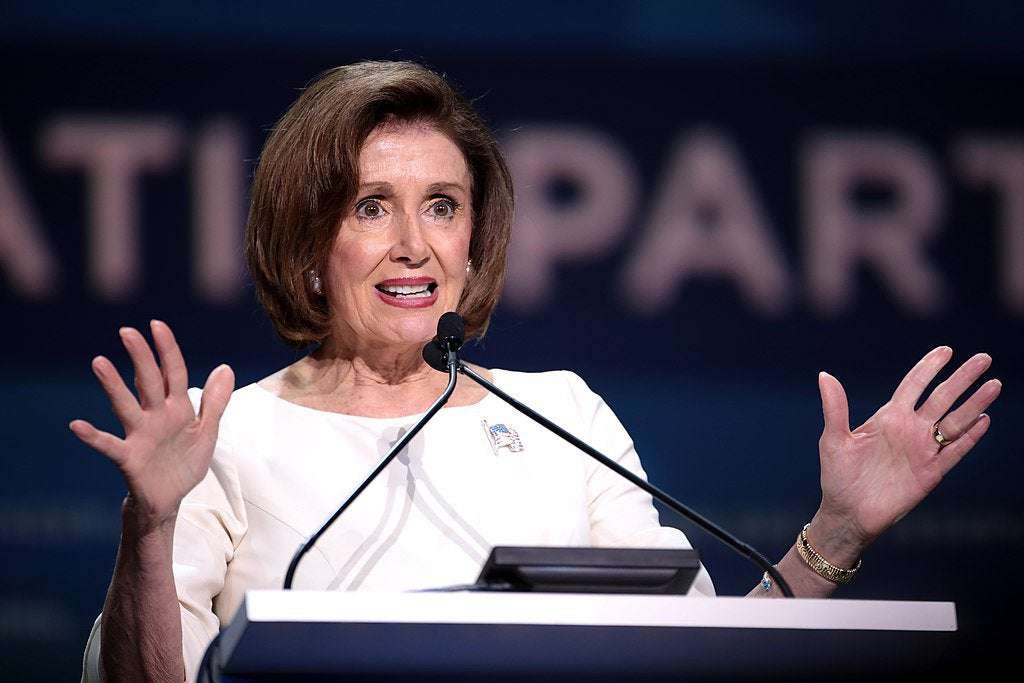All told, it’s difficult to imagine something more darkly symbolic of a decadent ruling class than a multimillionaire member of Congress mounting a transparently self-interested defense of political insider trading. Nonetheless, that’s exactly what House Speaker Nancy Pelosi did this week when asked about a proposed ban on members and their spouses holding and trading stocks while in office.
“This is a free market, and people — we are a free market economy,” Pelosi said during a weekly press conference. “They should be able to participate in that.”
The “they” in Pelosi’s formulation is certainly doing interesting work. Like many things about the United States’ “free market economy,” stock ownership is a kind of liberty most familiar to people with money: some 89 percent of adults in households earning $100,000 or more reportedly own it compared with less than a quarter of those in households earning less than $40,000. Pelosi was referring more specifically to members of her own profession and their staffs: a group that, when taken together, represents a much narrower sample of the population — not to mention one much closer to key economic decisions and legislative changes.
Nancy Pelosi’s stock ownership is a clear and visible conflict of interest, the kind of thing that wouldn’t be allowed in a functioning democratic society.
Members of Congress tend to be far wealthier than the general population, and it’s common practice for many of them to own and trade chunks of the very economy they’re tasked with managing and overseeing. At just over $46 million in net worth, Pelosi is herself among the richest members of Congress — ranked fifteenth overall, thanks in part to her husband’s holdings in the likes of Slack, Tesla, Disney, Visa, Salesforce, PayPal, Alphabet, Facebook, and Netflix, all of them major corporations that spend untold millions every year to lobby the government.
It’s a clear and visible conflict of interest, and the kind of thing that wouldn’t be allowed in a functioning democratic society. And, as recent history quite clearly shows, it’s one that quite easily leads to naked abuses of power.
There are many documented cases of federal lawmakers trading stocks in industries they oversee while holding important committee assignments. Several US senators infamously off-loaded a smorgasbord of stock following a classified briefing about the potential economic impact of the coronavirus — and instances like these are almost certainly just the tip of the iceberg.
The case for banning the trading or ownership of stocks among members of Congress is straightforward and has been made many times by the likes of Elizabeth Warren and Alexandria Ocasio-Cortez. As the former put it in May: “Every senator, member of Congress, president, Cabinet secretary, federal judge, and other senior officials in charge of writing the rules for our financial system should not be able to own or trade individual stocks.” “We are here to serve the public, not to profiteer,” argued AOC earlier this year, adding, “It’s shocking that it’s even been allowed up to this point.”
Both have a point. But considering the overbearing influence of money on America’s government and both of its major political parties, nothing about the current rules is even remotely shocking. The campaign finance system, to take an obvious example, is essentially legalized corruption. Retired politicians and staffers regularly cash in on their time in office, settling into plum corporate gigs and leveraging the personal networks they built while ostensibly public servants for individual gain.
Against such a backdrop, the practice of allowing sitting lawmakers to own and trade stocks seems no less outrageous but becomes decidedly less shocking. Much of the corrupt behavior that occurs regularly in Washington is, in effect, perfectly legal and out in the open: so much so that it can even elicit spirited defenses from the country’s most powerful elected officials.

Bekindtoall2020 on December 17th, 2021 at 13:21 UTC »
We have allowed the greed is good mentality for too long.
zbmcg on December 17th, 2021 at 13:08 UTC »
It's pretty fucking simple, Nancy. If you want to trade stocks, don't become an elected official. Insider trading is illegal for us mere mortals, and it's a pretty obvious conflict of interest.
Grunchlk on December 17th, 2021 at 11:40 UTC »
Pelosi is dead wrong on this.
If private citizens can have their trading restricted by their employers based on access to insider information, then so can public servants.